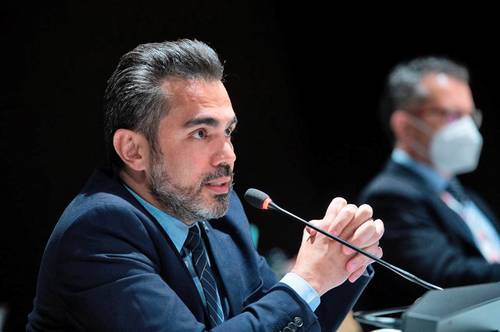Santiago. For governments to be more effective and efficient in attacking the illicit cigarette trade and in increasing the performance of anti-smoking policies, there must be a country strategy that involves multiple public bodies, says Rodrigo Santos Feijo, manager of the Protocol for the Elimination of Illicit Trade in Tobacco Products.
For example, that the Ministries of Finance and Health periodically dialogue, exchange information and design collective goals to confront a plague that kills half of smokers, which causes enormous health spending and significant losses to the economy.
Countries must recognize the importance of their ministries talking among themselves; these sectors must coordinate to discuss policies on tobacco control and the elimination of illicit trade.
dice.
The Protocol is an international treaty that pursues eliminate all forms of illicit trade in tobacco products through a set of measures to be adopted by countries in cooperation with each other
that is to say, a global solution to a global problem
.
The World Health Organization (WHO) estimates that 30 percent of international cigarette trade is smuggled and, according to the World Bank, the annual loss of revenue from tobacco taxes amounts to $40 billion.
In its six years of validity, the Protocol has been signed by 88 countries (Mexico is not among them), of which 69 have ratified it, seven of them Latin American: Brazil, Costa Rica, Ecuador, Nicaragua, Panama, Paraguay and Uruguay (Colombia signed it, but has not yet ratified it).
The Protocol complements the Framework Convention on Tobacco Control (FCTC), a global pact promoted since 2004 by the WHO and which has 186 members.
Beyond chronologies between one and the other, there are also other explanations for this marked difference.
The FCTC clearly concerns the health sector, while the Protocol is within the framework of public ministries, finance, customs, foreign ministries and there the adoption process may be slower.
he explains.
Many countries participate as observers of the Protocol and are understanding the gains they can obtain; there is international cooperation between those who are parties and those interested.
he adds.
He mentions that Mexico and Chile are two of the interested parties.
Monitoring, control
Another relevant point promoted by the Protocol is the construction of a global tracking and tracing system for cigarette trade, for which the FCTC secretariat announced in February a pilot plan in which members of the Protocol can exchange information about shipments.
The technology is there, each party has to register its administrator
he explains.
“The global system needs national systems to build an international tracking and tracing regime, for it to work we need countries to develop their national or regional systems.
To achieve that goal We are making progress in supporting countries to develop their national systems
.
One condition is essential: that they be independent of the tobacco industry.
The countries agreed to this because the tobacco companies’ attempt to offer their own system, their solution, was known, but the objectives of the industry and public health are irreconcilable, they want to sell and we want to reduce consumption. The track and trace system is not for the industry to have authenticity, but for governments to have control of the production of a product that kills half of its consumers.
The earrings
Santos Feijo details the priorities of the work in his charge: 1) Advance in having more countries subscribe and ratify the Protocol; 2) that the country parties support others to advance in defining traceability systems, We have started with the approval of an assistance mechanism, carrying out needs assessment exercises to implement protocol
; 3) promote cooperation and coordination, there is a package of measures for supply chain control; Working in isolation is not enough, cooperation is necessary
; 4) that legal measures are so strong to deter, because The illicit tobacco trade cannot be considered less important, we must understand the impact it has
.
The WHO considers that higher-income sectors are less likely to buy contraband cigarettes, since having sufficient income they do not consider it necessary to run the risk of purchasing products that have not complied with legal standards. Contraband cigarettes primarily target low-income populations and young people, who generally have less money to spend.
